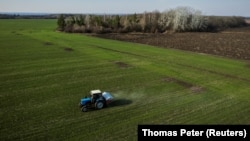U.S. Secretary of State Antony Blinken has accused Russia of using food as a weapon in its war against Ukraine by blocking ports used to ship grain and other commodities.
"The Russian government seems to think that using food as a weapon will help accomplish what its invasion has not -- to break the spirit of the Ukrainian people," Blinken said in an address on May 19 to the UN Security Council.
"As a result of the Russian government's actions, some 20 million tons of grain sit unused in Ukrainian silos," he said. As global food supplies dwindle, prices skyrocket, causing more people around the world to experience food insecurity, he added.
Russia and Ukraine together account for nearly a third of global wheat supplies. Ukraine is also a major exporter of corn, barley, sunflower oil, and rapeseed oil.
Blinken appealed to Russia to stop blockading the ports so that food produced in Ukraine can begin flowing again.
Russian Ambassador Vassily Nebenzia said it was "absolutely false" that Russia was to blame for a crisis that he claimed has been ongoing for several years.
He accused Ukraine of refusing to cooperate with shipping companies to free up dozens of foreign freighters that are blocked in ports and said Ukraine has placed mines along the Black Sea coast.
Nebenzia also blamed Western sanctions imposed on Moscow for slowing Russian exports of food and fertilizer.
Blinken rejected Russian claims that sanctions were to blame for the food crisis.
"Sanctions imposed by the United States and many other countries deliberately include carve-outs for food, for fertilizer, and seeds from Russia," he said. "The decision to weaponize food is Moscow's and Moscow's alone."








